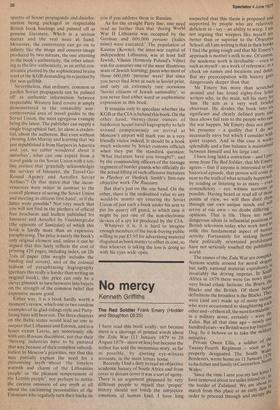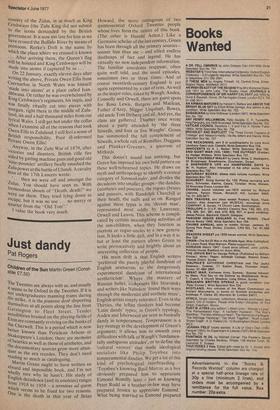No mercy
Kenneth Griffiths
The Red Soldier Frank Emery (Hodder and Stoughton £6.25)
I have read this book avidly: not because there is a shortage of printed words about the Zulu War (11 January 1879 to 28 August 1879more or less) but because the author has told the monstrous story, as far as possible, by quoting eye-witness accounts, in the main letters home.
Recently I had a duty to read an objective academic history of South Africa and from cover to distant cover it was a sort of agony. There is an argument proposed by very different people to myself that 'proper' history should not lou4 the subjective emotions of human kind. I have long
suspected that this thesis is proposed and supported by people who are relatively deficient in say an ability to weep. I ant not arguing that weepers like myself are better than or superior to the Objective School; all I am writing is that in their books I find the going rough and that Mr Emery's approach is mother's milk to me. Of course, the academic work is invaluable even to such as myself as a work of reference; as a check on names and locations and dates. But my preoccupation with history goes dangerously deeper than that. Mr Emery has more than scratched around and has found eighty-five letter writers who, in the main, tell his story for him. He acts as a very well briefed chairman. He divides the book into Sig, significant and clearly defined parts an then allows full rein to the people who sao' the war happen. Mr Emery does not press his presence a quality that I do ant necessarily envy but which I consider with quiet respect. And in this case it works splendidly and a fine balance is maintained between himself and his large cast. I have long held a conviction and I pre' sump from The Red Soldier, that Mr EmerY. agrees that if anyone is interested in anY historical episode, that person will come as near to the truth of what actually happened' by reading or listening to as many even contradictory eye witness accounts as possible. Having heard or read all of these points of view, we will then distil then! through our own unique minds and will arrive at our own no doubt differing opinions. That is life. There are Inall,Y dangerous idiots in influential positions 'a British television today who work hard to stifle this fundamental aspect of human activity. Fortunately for sinking Br it' their politically orientated prohibitions have not seriously touched the publishing world. The causes of the Zulu War are comPleg: Nations scuttle around for moral slog'll,; but sadly national material expedieneY tib invariably the driving impetus. In SO1,I;,:e Africa in 1879 there were (as now) t"'-,,e very broad. ethnic factions: the Boers,d Blacks and the British. Of these brna,, definitions the broadest is the Blacks. The?. were (and are) made up of many nation; who were accustomed to slaughtering eac other andof them all the most formidable; in a military sense, certainly were t,,,e Zulus. But all that time ago nearly 01 hundred years-we British were top ImPeri iDnoitg.tiSvoe.it behove us to take the rnil ia lt°r; f the Private Owen Ellis, a soldier 0. he Twenty-Fourth Regiment soon to jues properly designated The South Wa0/9 Borderers, wrote home on 11 January 1°,'th to his father and family in Caernarfon, I'l°1 Wales: 'Since the time I sent you my last lelte!toj have removed about ten miles inland Vi7: to the border of Zululand. We are abouL march from this place at an early date,;; order to proceed through and occuPY
country of the Zulus, in as much as King Cetshwayo (the Zulu King did not submit to the terms demanded by the British government: It is now too late for him as we have crossed the Buffalo River by means of Pontoons. Rorke's Drift is the name by Which the place where we crossed is known • • After arriving there, the Queen's flag Will be hoisted and King Cetshwayo will be made into atoms if captured by us .
On 22 January, exactly eleven days after Writing the above, Private Owen Ellis from Caernarfon in North Wales was himself 'made into atoms' at a place called Isandillwana. Or rather he was overwhelmed by King Cetshwayo's regiments, his impis, and was finally ritually cut into pieces with assegais, right there in the middle of Zululand, six and a half thousand miles from our lyrical Wales. I still get hot under the collar When I examine all of the reasons that took Owen Ellis to Zululand. I still feel a sense of British responsibility. Poor ill-informed Private Owen Ellis!
Anyway, in the Zulu War of 1879, after victories and disasters, British rifle fire aided by gatling machine guns and good old 'nine-pounder' artillery finally smashed the Zulu power at the battle of Ulundi. A cavalry ITT] of the 17th Lancers wrote: • • . then we were off and amongst the Zulus. You should have seen us. With tremendous shouts of "Death, death!" we were on them. -They tried lying down to escape, but it was no use . . . no mercy or quarter from the "Old Tots".'
I value the book very much.



































 Previous page
Previous page